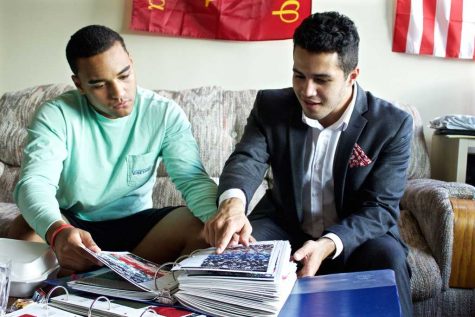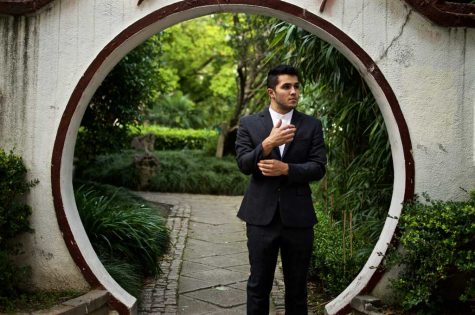Tom Yanez boarded the Shanghai Metro in search of a custom-made suit, but ended up forming a friendship that would stitch together a startup business.
Yanez, a junior marketing and Mandarin student at Pitt, was studying abroad in China in fall 2014 and went to see a tailor, Youzhi Hao, for a custom suit.
With one shirt button missing to accommodate Yanez’s short torso, the outfit — a grey wool suit and white cotton shirt — is a comfortable suit he still wears in the fall and winter months.
There, Yanez realized men don’t need to settle for generic, ill-fitting suits sold at department stores and menswear stores. With his help, young business professionals in the United States can have their suits tailor-made all the way from Shanghai.
Along with Caleb Smith, an accounting student at James Madison University, Yanez founded Ampersand, LLC — a one-on-one consultation company for tailor-made clothes — last summer. Ampersand has expanded its client base to eight customers at three universities and recently began making women’s dresses and overcoats.
Ampersand diverges from other clothing companies because it allows customers to design clothes and get custom sizing for the same amount as an off-the-rack suit — around $200.
Yanez used the skills he learned at Pitt to develop a business relationship with the tailor.
“It was a lot of going to restaurants, drinking too much beer, smoking too many cigarettes,” Yanez said of his friendship with the tailor. “A couple times a week, I would go down to his shop and learn how to take measurements and do research [for the business].”
Yanez said he negotiated a deal with Hao, in which Hao discounts Ampersand’s orders so the company can make a profit. Yanez sends his customers’ orders to Hao, who sends the clothes to the customer’s address within 18 days.
Back in America, Yanez works with Desjoire Smith, a Howard University student, and Caleb Smith, at JMU, who consult clients on their respective campuses. Desjoire Smith, Caleb Smith and Yanez met at their high school — a boarding school just outside of Philadelphia called George School.
At consultations, the three Ampersand employees find out what customers want, let them pick out their fabric from more than 300 swatches and give professional advice, like avoiding a black suit for an interview.
“Everything comes with our honest opinion,” Yanez said. “Wearing a suit that’s tailored to you — it changes the game.”
Potential customers at Howard, JMU and Pitt can text or email their school’s representative to set up a consultation.
All three employees, who are paid on commission, give consultations and sell suits at their respective schools, but Pitt’s market has had the most success with six clients who have purchased 15 shirts, two suits, an overcoat and a dress.

Evan Turman, a junior studying marketing, finance and economics, was hesitant at first about buying a suit from Ampersand. For the first time, he wanted to stop buying off-the-rack so he could find a more personalized style.
Turman, one of Yanez’s friends, became one of Ampersand’s first customers.
Turman invited Yanez and his fabric binders, filled with hundreds of colorful linen, cotton and wool swatches, to his home on Bouquet Street for a consultation in the fall. Yanez walked Turman through each material, guided him in picking out colors and taking his measurements.
Turman bought two Ampersand shirts — button downs with floral-print cuffs and collars — and a suit — a navy light wool blend — with three patterned pocket squares for a total of about $290.
“The cost that he’s charging his customers is extremely affordable,” Turman said. “In the back of my head I was wondering, ‘How good is the quality going to be?’”
Turman said the personalization aspect of Ampersand’s products was the most impressive part of his experience.
“When I buy a suit or a business [casual] shirt, I gotta make sure I have swag,” Turman said. “The fact that you have the ability to pick out a shirt means you have a little more confidence when you wear it.”
Yanez said helping clients add a bit of original style, like a colorful cuff, to conservative clothes is his favorite part of the job.
“I really like classic looking things with a little bit of a twist or flair,” Yanez said. “Ampersand is individuality … it’s not really one style … you just find your own.”
According to his mother, Polly Yanez, clothing and personality have always been one of the same for her son.
“I think he enjoys experimenting with fashion,” Polly Yanez said. “Not just to do whatever the dominant culture is dictating.”
Polly Yanez, a chemistry and biology teacher at the George School, said she hopes her son’s business doesn’t draw from his focus on school.
“The grades, in my view, are really important,” Polly Yanez said. “However, the business is hands-on experience, and if he can balance those two, then he can be very successful.”
If Ampersand tanks within the next year, Yanez said the experience would still be invaluable. Yanez spends about 15 hours per week running the business, which he said is difficult to balance with school. But the sacrifice gives him something tangible in his business classes.
“It makes school and classes more interesting for me because I can think about concepts in class and how they relate to the business,” Yanez said in a text message. “It’s no longer in abstract.”
Looking to expand, Yanez said he’ll remain picky about consultants who are personable and fit the brand. Yanez hopes to train consultants at Northeastern University and Boston University, where he has friends from high school, by next year.

According to Associate Dean of the College of Business Administration Audrey Murrell, Ampersand’s caution is a good thing. Ninety-two percent of all startups fail within the first three years, according to the 2012 Startup Genome Report.
“Premature scaling means getting big too soon or too fast,” Murrell said in an email. “For example, spending money on marketing, hiring, et cetera, before the business had mapped out a working business model.”
Murrell said Yanez’s “great deal of talent and passion for his business venture” are positives, but the only thing that can ensure Ampersand’s success is a thorough perception and application of international business.
“Understanding key business issues such as managing global supply chains and international economics will be key to their long-term success and sustainability,” Murrell said of the startup.
Yanez said he has a good understanding of the risks and the benefits to outsourcing labor, so he’s confident in Ampersand’s success.
“Volume totally isn’t an issue — we don’t have stores, we don’t have inventory,” Yanez said. “So there’s not a lot of risk here on the ground.”
Yanez said he’s adding women’s clothes to the catalog, donating a suit to a contest at the career fair and hoping to expand his market to Pitt’s athletes.
“People come in all shapes and sizes — especially athletes,” Yanez said. “Finding stuff off the rack is nearly impossible.”
For all of his potential customers, Yanez said the versatility of the products and ease of the process make choosing to buy from Ampersand an easy decision.
“We’re not trying to impose standards on you,” Yanez said. “We really give you the freedom to be you.”


